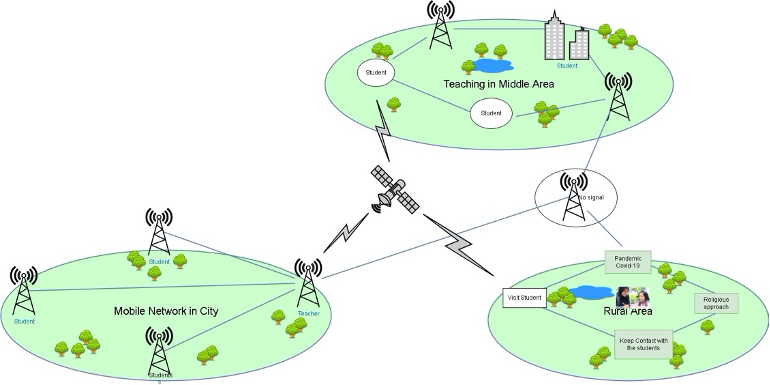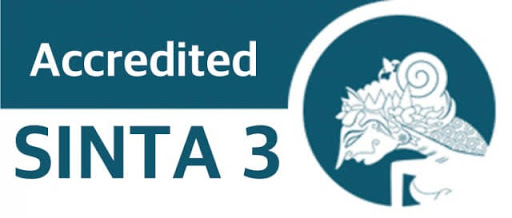Pedagogy teachers’ competence establishes students’ digital ethics: Case of educational modernization in Indonesia
DOI:
https://doi.org/10.12928/ijei.v3i1.6120Keywords:
Indonesian educational modernization, students’ digital ethics, teachers’ pedagogical competenceAbstract
This research aims to explore the competence of digital pedagogy of teachers towards the establishment of students’ digital ethics in the modernization of Indonesian education. This research uses the phenomenological approach to examine the essence of teachers' digital pedagogy competence. We collected the data using semi-structured interviews with five primary school teachers in Indonesia who have worked for more than three years. We chose the subjects based on their capability in guiding students in their routine. The results showed that the pedagogical teaching competence to establish the students’ digital ethics in education modernization are driven by some factors, namely: (1) the teachers have responsibility at work to self-actualize, (2) the teachers have high confidence to establish digital ethic in education modernization, and (3) the teachers use research and spiritual approaches to change the students’ ethics in education modernization. These three factors ultimately encourage teachers to establish digital ethics in education modernization. Therefore, it is important to establish the policy regarding the pedagogy digital competence. Furthermore, teachers can also take advantage of these findings by maximizing antecedent factors to increase digital pedagogy competence at work.
References
APA. (2017). Ethical principles of psychologists and code of conduct. American Psychologist, 57(12), 1–20. DOI: 10.1037/0003-066X.57.12.1060
Barrett, J. R. (2007). The researcher as instrument: learning to conduct qualitative research through analyzing and interpreting a choral rehearsal. Music Education Research, 9(3), 417–433. DOI: 10.1080/14613800701587795
Carr, D. (2004). Moral education and objectivity of values. In D. Carr (Ed.), Education, knowledge and truth: Beyond the postmodern impasse (pp. 118-132). Routledge. DOI: 10.4324/9780203299128
Coe, R., Aloisi, C., Higgins, S., & Major, L. E. (2014). What makes great teaching? Review of the underpinning research. http://www.suttontrust.com/researcharchive/great-teaching/
Denzin, N. K. & Lincoln, Y. S. (2005). The SAGE handbook of qualitative research. Sage Publications.
Dinansyah, F. (2021). Pilar digital ethics. Webinar No Digital Addiction and Being Creative and Productive. Yogyakarta.
Kemdiknas. (2003). Undang-Undang Nomor 20 Tahun 2003 tentang Sistem Pendidikan Nasional. Kementerian Pendidikan Nasional.
Ferrari, A. (2013). DIGCOMP: A framework for developing and understanding digital competence in Europe (Y. Punie & B. N. Brecko, Eds.). Publications Office of the European Union. DOI: 10.2788/52966
Fiero, G. K. (2015). The Humanistic Tradition: Modernism, Postmodernism, and the Global Perspective. Mc Graw Hill.
Fu, W. H., & Satrianawati. (2020). The episteme of happiness as ontological vertical in modern education: The Maslow answer. International Journal of Education and Learning, 2(2), 76–85. DOI: 10.31763/ijele.v2i2.114
Gabriella, E. C. (2013). The Ethics and Aesthetics of Hacking. Princeton University Press.
Gendlin, E. T. (2018). Saying What We Mean: Implicit Precision and the Responsive Order (E. S. Casey & D. M. Schoeller, Eds.). Northwestern University Press. DOI: 10.2307/j.ctv7tq4qc
Halstead, J. M., & Taylor, M. J. (2000). Learning and teaching about values: A review of recent research. Cambridge Journal of Education, 30(2), 169–202. DOI: 10.1080/713657146
Harding, L. (2017). Building positive thinking habits: Increasing self-confidence & resilience in young people through CBT. Educational Psychology in Practice, 33(3), 335–336. DOI: 10.1080/02667363.2017.1295603
Hume, D. (1983). An Enquiry Concerning the Principles of Morals (1st ed.) (J. B. Schneewind, Ed.). Hackett Publishing Company.
Karmila, W. (2021). Reflections on the implementation of independent learning during the Covid 19 pandemic at the level of primary education. Webinar on Learning Reflections in the Covid-19 Pandemic and Strategies towards a New Habit at the Elementary School Level. UKSW.
Keen, A. (2019). How to fix the future: Staying human in the digital age. Atlantic Monthly Press.
Keen, M. F. (1996). Teaching qualitative methods: A face-to-face encounter. Teaching Sociology, 24(2), 166–176. DOI: 10.2307/1318807
Kemdikbud. (2020). Peraturan Menteri Pendidikan dan Kebudayaan Republik Indonesia Nomor 22 Tahun 2020 tentang Standar Proses Pendidikan Dasar dan Menengah. Kementerian Pendidikan dan Kebudayaan.
Kuijt, I. (2002). Life in Neolithic Farming Communities Social Organization, Identity, and Differentiation (L. Manzanilla, Ed.). Kluwer Academic Publishers.
Leedy, P. D., & Ormrod, J. E. (2003). Practical research: Planning and research (J. W. Johnston, Ed.). Pearson Education.
Maddux, J. E., & Lopez, S. J. (2015). Deconstructing the illness ideology and constructing an ideology of human strengths and potential in clinical psychology. Positive Psychology in Practice: Promoting Human Flourishing in Work, Health, Education, and Everyday Life (2nd ed.). DOI: 10.1002/9781118996874.ch25
Merriam, S. B., & Tisdell, E. J. (2016). Conducting Effective Interviews in Qualitative Research: A Guide to Design and Implementation. Jossey-Bass.
Mazrieva, E. (2021). Indeks keberadaban digital: Indonesia terburuk se-Asia Tenggara. VoA Indonesia. https://www.voaindonesia.com/a/indeks-keberadaban-digital-indonesia-terburuk-se-asia-tenggara/5794123.html.
Noddings, N. (2003). Happiness and Education. Cambridge University Press.
Nurutdinova, A. R., Dmitrieva, E. V., Zakieva, Z. R., Astafeva, A. E., & Galiullina, E. I. (2017). Awareness in acquisitive understanding of second language oral aspect: Intercultural, socio-cultural and cross-cultural reflections. XLinguae, 10(4), 69–83. DOI: 10.18355/XL.2017.10.04.07
OTSO. (2011). Ethics of Teaching: Pedagogical Competence. Teaching and Learning at OISE. https://wordpress.oise.utoronto.ca/otso/2011/08/09/ethics-of-teaching-pedagogical-competence/
Raharjo, A. B. (2021). Digital ethics issue and technology use. Webinar Literasi Digital Kabupaten Sumenep. Surabaya.
Rania, N., & Pinna, L. (2021). Adapting qualitative methods during the COVID-19 era: Factors to consider for successful use of online photovoice. The Qualitative Report, 26(8), 2711–2729. DOI: 10.46743/2160-3715/2021.4863
Riser, R. V. (2010). Defying Disfranchisement: Black Voting Rights Activism in the Jim Crow South, 1890-1908. Louisiana State University Press.
Satrianawati, S., & Fu, W. H. (2019). Education for sustainable development (ESD) in Indonesia: A conceptual framework. International Journal of Education and Learning, 1(1), 42-49. DOI: 10.31763/ijele.v1i1.33
Schell, K., Ferguson, A., Hamoline, R., Shea, J., & Thomas-Maclean, R. (2009). Photovoice as a teaching tool: Learning by doing with visual methods. International Journal of Teaching and Learning in Higher Education, 21(3), 340–352.
Seligman, M., & Csziksentmihaly, M. (2000). American psychologist: Special issue on happiness, excellence, and optimal human functioning. American Psychologist, 55(1), 5–14. DOI: 10.1037//0003-066X.55.1.5
Siwek, Z., Oleszkowicz, A., & Słowińska, A. (2017). Values realized in personal strivings and motivation, and meaning in life in Polish University students. Journal of Happiness Studies, 18(2), 549–573. DOI: 10.1007/s10902-016-9737-x
Suyatno, S., Hasanah, E., Wantini, W., Pambudi, D. I., & Supardi, S. (2021). Meaning in work of Indonesian teachers: A phenomenological research. Qualitative Report, 26(10), 3189–3213.
Tolib, A. (2015). Pendidikan di pondok pesantren modern. Risalah Jurnal Pendidikan dan Studi Islam, 2(1), 60–66. DOI: 10.31943/jurnal_risalah.v2i1.12
Vasilyeva, E. R., & Sinagatullin, I. M. (2020). Influence of globalization on modern education. In International Session on Factors of Regional Extensive Development (FRED 2019) (pp. 75-78). Atlantis Press.
Warde, A., & Martens, L. (2003). Eating Out: Social Differentiation, Consumption and Pleasure. Cambridge University Press. DOI: 10.1017/cbo9780511488894.006
Worden, K. J. (2019). Disengagement in the digital age: A Virtue ethical approach to epistemic sorting on social media. Moral Philosophy and Politics, 6(2), 235–259. DOI: 10.1515/mopp-2018-0066
Yin, R. K. (2011). Applications of Case Study Research. Sage Publications.
Yin, R. K. (2016). Qualitative Research from Start to Finish. The Guilford Press.
Yuh, L. (2015). Moral Education, Modernization Imperatives, and the People's Elementary Reader (1895): Accommodation in the Early History of Modern Education in Korea. Acta Koreana, 18(2), 327-355.

Downloads
Published
How to Cite
Issue
Section
License
Copyright (c) 2022 Wen Heng Fu, Satrianawati Satrianawati

This work is licensed under a Creative Commons Attribution-ShareAlike 4.0 International License.
Authors who publish with this journal agree to the following terms:
- Authors retain copyright with the work simultaneously licensed under a Creative Commons Attribution License that allows others to share the work with an acknowledgement of the work's authorship and initial publication in this journal.
- Authors are able to enter into separate, additional contractual arrangements for the non-exclusive distribution of the journal's published version of the work (e.g., post it to an institutional repository or publish it in a book), with an acknowledgement of its initial publication in this journal.
- Authors are permitted and encouraged to post their work online (e.g., in institutional repositories or on their website) prior to and during the submission process, as it can lead to productive exchanges, as well as earlier and greater citation of published work (See The Effect of Open Access).




